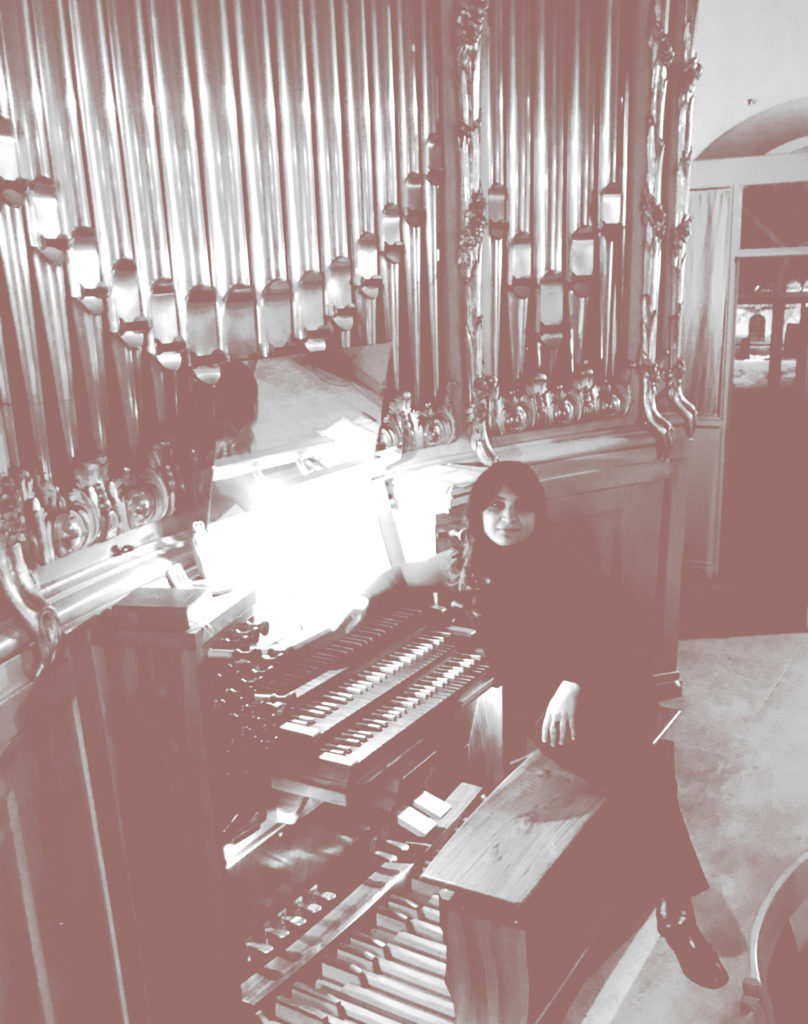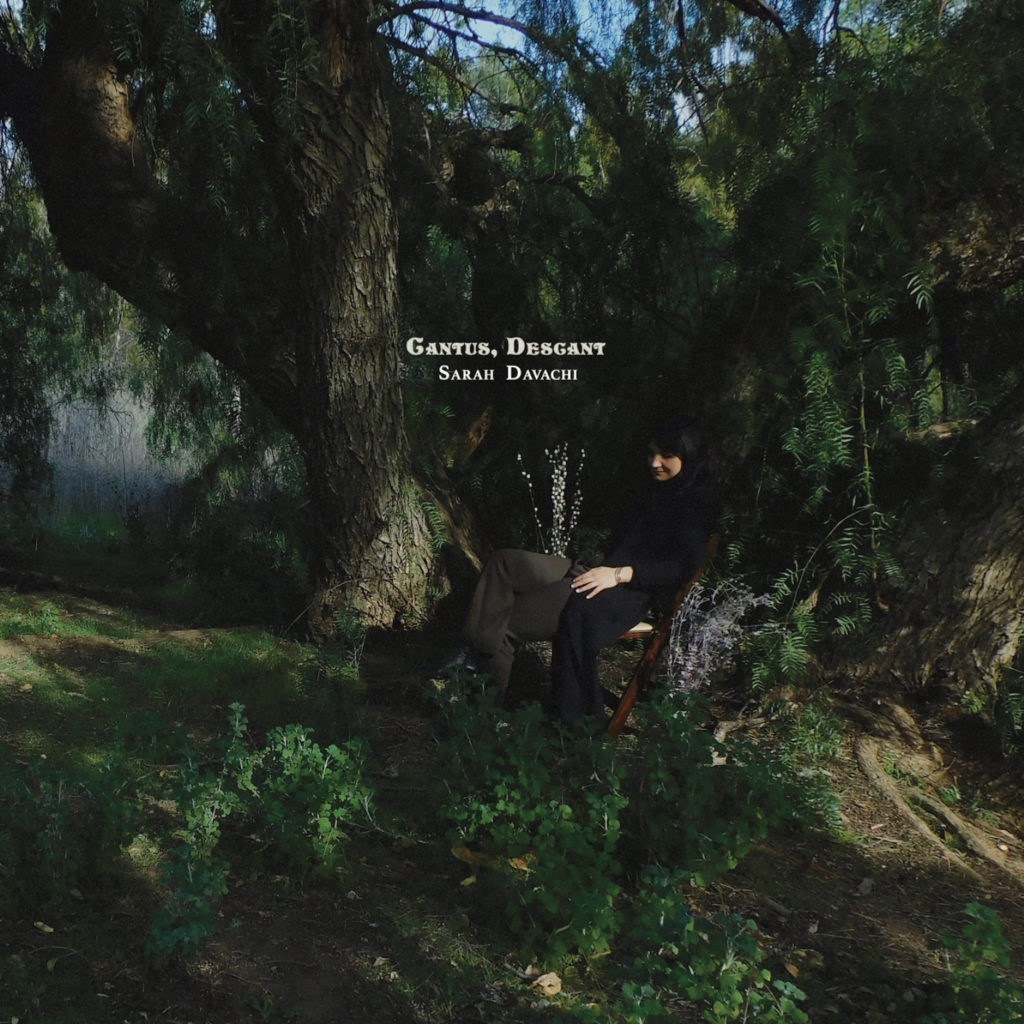Prolific Canadian composer Sarah Davachi is gearing up to release her latest full-length double LP Cantus, Descant. Working primarily with an organ, the electroacoustic performer explores existential themes of transience, while also adding her own softly murmured vocals into the mix for the first time, bolstering the emotional resonance of this project. Washing over its listeners with waves of hypnotic drones that slowly unfurl, Cantus, Descant rewards patience with aural intimacy. S/ recently spoke with Davachi about her creative process when recording music, the seminal groundwork that inspired her oeuvre, and how the Canadian musical landscape has helped nuance her sonic palette.
Describe your creative process when composing the sounds for Cantus, Descant. Was each note written in advance, or did you allow for some improvisational impulses to infiltrate each arrangement?
“I would say that Cantus, Descant followed a pretty similar path as most of my previous albums, in that there was a lot of planning during the initial stages. I’ll start making extensive notes about what I want to do in an album, really putting the whole concept of the project together, sometimes years in advance of the actual recording. I knew I wanted this record to be focused on the organ, so the main difference here is that I had to carve out specific times to work on the material since I couldn’t just go into my studio and set up an ongoing thing. I started the first recordings for the album in August of 2017, where I did a few recording sessions on pipe organs in Vancouver and Montréal. That was all improvised, and some of that material ended up on the record, other parts of it I put onto a cassette that is accompanying the deluxe edition of the LP.
“I had access to an organ in LA that I began working with regularly, while also having a bunch of live organ performances lined up throughout 2018. I decided to just spend that entire year generating the material for the album. Those performances would start with improvisation and then once I uncovered things that I liked I would then write them down and develop them and flesh them out more. That’s the way I tend to work all the time, regardless of which instrument I’m using. In the fall of 2019, I took everything into my home studio and started editing and mixing and sculpting it into the album, which is again how I always work. I recorded the songs during that time, manipulated some of the acoustic organ recordings with tape echo and things like that, and added some Mellotron overdubs.”

What made you want to include vocals in your compositions for the first time on record? Was there any hesitation in broadening the scope of your sonic palette with your own singing?
“I love songs, I’ve always been fascinated by the process of songwriting, and it’s something I’ve wanted to do for years. I’ve never taken the effort to train my voice in any way and I always figured that I would do better behind the scenes in that kind of situation, as a producer or an arranger or something. However, there was a lot of stuff going on emotionally and conceptually in this record and it felt like the right time to experiment. There was definitely some hesitation but I’m the type of person who likes to figure out how to make things work, I don’t adhere to the ‘you can’t do that’ attitude. I’ve not been trained in violin or flute either, but I’ve played those instruments on my records too, so this wasn’t much different from that.”
What were the contextual implications informing each piece within Cantus, Descant? What impression did you want to impart in the listener?
“The overarching concept of the album concerns impermanence, so that’s definitely something I tried to impart in terms of the instruments I was playing and the processes I was using. Certain instruments already had aspects of impermanence and fragility built into their idiom—the foot-pumped reed organ in LA, the Renaissance-era pipe organ in Amsterdam, the Mellotron, the tape echo—so I tried to work directly with those elements and bring out some of their latent aspects. The track titles and the album title reference ideas about states of being, both in the sense of the individual and then in terms of larger, more mythic things, like natural landscapes. I wanted there to be a sense of reconciliation with impermanence, not a fear of it.”
You are renowned for being quite prolific with releasing recorded material, how do you stay inspired with each successive release?
“I don’t really work in album cycles in the traditional sense, I never have. I’m always working on multiple things at the same time—I think of albums as being self-contained worlds, so I guess in my mind I can be working on two very different albums at the same time without much of an issue jumping from one to the other. Even though I put out one or two albums every year, it doesn’t mean that I start working on the next one just as soon as the other one is finished; rather, the next one or two have already been in progress for quite some time. Usually, I’ll spend around two years or so working on an album, maybe with more concentrated time in the six months prior to when I’d like to have it finished. My approach to composition is and always has been very connected to instruments, the dialogue and individuality that goes along with each interaction, including studio techniques.
“I think the main reason I’ve been able to be prolific is because I love exploring and really going deep into different instrumental voices. Some albums are entirely electronic, some are entirely acoustic, most are a mix of the two which is what I enjoy most.”

How has Canadian music culture, especially within the modern classical lexicon, nurtured your own compositional experiments?
“It’s complicated given that most of my adult life has been spent living in California—the San Francisco Bay Area and Los Angeles, both of which have their own unique way of fostering experimentation. I grew up in Calgary and I think if it wasn’t for the National Music Centre, where I was employed as a tour guide and researcher for a decade, I probably would have been pretty lost in those early days.
“I also worked for a time at Western Front, a non-profit artist-run centre that’s hosted some of the most incredible experimental concerts, performances, and exhibitions since the 1970s. Being a part of that history, having access to the archives there, really meant a lot to me.
“It maybe sounds cliché to talk about the weather, but I think Canadians have an interesting work ethic that probably develops in part because of the peculiar length of the winter season. Growing up in Calgary, being kind of plopped between two very different landscapes, one kind of like a massive cocoon (the Rockies) and the other wide open and almost oceanic (the Prairies), definitely has affected how I think about sound.”
How do you feel your sonic trajectory has evolved from your earliest recorded work until Cantus, Descant?
“I think it’s changed in a lot of ways but, in my mind, it’s mostly just moved closer to a form of intimacy with sound. In some ways it’s become more deliberate, especially with the songs that are on Cantus, Descant, but then it’s also become a lot more experimental and exploratory. Early on a lot of the work that I was doing with synthesizers was singular, like I would move from piece to piece and I’d kind of just stop when I had enough for an album or a cassette. So, when I listen to those early albums, I really love a lot of the material, but I don’t hear them as being necessarily self-contained, which is what I actively work toward now.”
“I work with a lot of different instruments, but I’ve also definitely developed my own approach to the ones I use most, which is probably most apparent on Cantus, Descant, with the various organs and Mellotron.
“I tend to reject the notion that things of this sort get “better” over time. I think they just change and reflect different attitudes, interests, and needs. I’ve also become more interested in the past few years in straight acoustic performances; I’ve never really worked with that kind of spare, imprecise, almost lo-fi acoustic intimacy before, but I love it and it’s all throughout Cantus, Descant.”
Cantus, Descant will be released on September 18, 2020, preorder your copy here.

